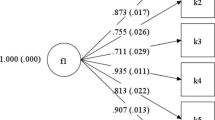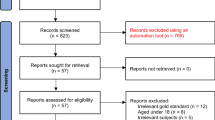Abstract
BACKGROUND: Telephone assessment of depression for research purposes is increasingly being used. The Patient Health Questionnaire 9-item depression module (PHQ-9) is a well-validated, brief, self-reported, diagnostic, and severity measure of depression designed for use in primary care (PC). To our knowledge, there are no available data regarding its validity when administered over the telephone.
OBJECTIVE: The aims of the present study were to evaluate agreement between self-administered and telephone-administered PHQ-9, to investigate possible systematic bias, and to evaluate the internal consistency of the telephone-administered PHQ-9.
METHODS: Three hundred and forty-six participants from two PC centers were assessed twice with the PHQ-9. Participants were divided into 4 groups according to administration procedure order and administration procedure of the PHQ-9: Self-administered/Telephone-administered; Telephone-administered/Self-administered; Telephone-administered/Telephone-administered; and Self-administered/Self-administered. The first 2 groups served for analyzing the procedural validity of telephone-administered PHQ-9. The last 2 allowed a test-retest reliability analysis of both self- and telephone-administered PHQ-9. Intraclass correlation coefficient (ICC) and weighted κ (for each item) were calculated as measures of concordance. Additionally, Pearson’s correlation coefficient, Student’s t-test, and Cronbach’s α were analyzed.
RESULTS: Intraclass correlation coefficient and weighted κ between both administration procedures were excellent, revealing a strong concordance between telephone- and self-administered PHQ-9. A small and clinically nonsignificant tendency was observed toward lower scores for the telephone-administered PHQ-9. The internal consistency of the telephone-administered PHQ-9 was high and close to the self-administered one.
CONCLUSIONS: Telephone and in-person assessments by means of the PHQ-9 yield similar results. Thus, telephone administration of the PHQ-9 seems to be a reliable procedure for assessing depression in PC.
Similar content being viewed by others
References
World Mental Health Survey Consortium. Prevalence, severity, and unmet need for treatment of mental disorders in the World Health Organization World Mental Health Survey. JAMA. 2004;291:2581–90.
Regier DA, Narrow WE, Rae DS, Manderscheid RW, Locke BZ, Goodwin FK. The de facto US mental and addictive disorders service system. Arch Gen Psychiatr. 1993;50:85–94.
Narrow WE, Regier DA, Rae DS, Manderscheid RW, Locke BZ. Use of services by persons with mental and addictive disorders. Arch Gen Psychiatr. 1993;50:95–107.
Murlow CD, Williams JW, Gerety MB, Ramirez G, Montiel OM, Kerber C. Case-finding instruments for depression in primary care settings. Ann Intern Med. 1995;122:913–21.
Williams JW, Noël PH, Cordes JA, Ramirez G, Pignone M. Is this patient clinically depressed? JAMA 287:1160–70.
McDowell I, Kristjansson E, Newell C. Depression. In: McDowell I, Newell C., eds. Measuring Health: A Guide to Rating Scales and Questionnaires. 2nd edn. New York, NY: Oxford University Press; 1996:238–86.
Spitzer RL, Kroenke K, Williams JB. Patient Health Questionnaire Primary Care Study Group. Validation and utility of a self-report version of the PRIME-MD: the PHQ primary care study. JAMA. 1999;282:1737–44.
American Psychiatric Association. Diagnostic and Statistical Manual of Mental Disorders DSM-IV-TR 4th edn Text Revision. Washington, DC: American Psychiatric Association; 2000.
Diez-Quevedo C, Rangil T, Sanchez-Planell L, Kroenke K, Spitzer RL. Validation and utility of the Patient Health Questionnaire in diagnosing mental disorders in 1003 general hospital Spanish impatients. Psychosom Med. 2001;63:679–86.
Gräfe K, Zipfel S, Herzog W, Löwe B. Screening for psychiatric disorders with the Patient Health Questionnaire (PHQ). Results from the German validation study. Diagnostica. 2004;50:171–81.
Becker S, Al Zaid K, Al Faris E. Screening for somatization and depression in Saudi Arabia: a validation study of the PHQ in primary care. Int J Psychiatr Med. 2002;32:271–83.
Kroenke K, Spitzer RL, Williams JBW. The PHQ-9 validity of a brief depression severity measure. J Gen Intern Med. 2001;16:606–13.
Wulsin L, Somoza E, Heck J. The feasibility of using the Spanish PHQ-9 to screen for depression in primary care in Honduras. Prim Care Companion J Clin Psychiatr. 2002;4:191–5.
Löwe B, Kroenke K, Herzog W, Gräfe K. Measuring depression outcome with a brief self-report instrument: sensitivity to change of the Patient Health Questionnaire (PHQ-9). J Affect Disorders. 2004;81:61–6.
Löwe B, Spitzer RL, Gräfe K, et al. Comparative validity of three screening questionnaires for DSM-IV depressive disorders and physicians’ diagnoses. J Affect Disorders. 2004;81:61–6.
Spitzer RL, Williams JB. Clasificación de los transtornos mentales [Classification of mental disorders]. In: Kaplan HI, Sakock BJ, eds. Tratado de psiquiatría [Comprehensive Textbook of Psychiatry]. 2nd edn. Barcelona, Spain: Salvat; 1989:585–607.
Simon GE, Revicki D, VonKorff M. Telephone assessment of depression severity. J Psychiatr Res. 1993;27:247–52.
Aneshensel CS, Frerichs RR, Clark VA, Yocopenic PA. Measuring depression in the community: a comparison of telephone and personal interviews. Public Opin Q. 1982;46:110–21.
Doménech JM. Fundamentos de diseño y estadística. UD 14: Medida del cambio: Análisis de diseños con medidas intrasujeto [Statistics and Design Basis. UD 14: Change Measures: Intra-Subject Measure Design Analysis]. Barcelona, Spain: Signo; 2002.
Helzer JE, Robins LN, McEvoy LT, et al. A comparison of clinical and diagnostic interview schedule diagnosis. Physician reexamination of lay-interviewed cases in the general population. Arch Gen Psychiatr. 1985;42:657–66.
Evans M, Kessler D, Lewis G, Peters TJ, Sharp D. Assessing mental health in primary care research using standardized scales: can it be carried out over the telephone? Psychol Med. 2004;34:157–62.
Rohde P, Lewinsohn PM, Seeley JR. Comparability of telephone and face-to-face interviews in assessing axis I and II disorders. Am J Psychiatr. 1997;154:1593–8.
Fenig S, Levav I, Kohn R, Yelin N. Telephone vs face-to-face interviewing in a community psychiatric survey. Am J Public Health. 1993;83:896–8.
Jorm AF, Duncan-Jones P, Scott R. An analysis of the re-test artifact in longitudinal studies of psychiatric symptoms and personality. Psychol Med. 1989;19:487–93.
Author information
Authors and Affiliations
Corresponding author
Additional information
The authors have no conflicts of interest to report.
This study was supported by a grant from the Catalan Agency for Health Technology Assessment and Research (063/26/2000 and it is part of the IRYSS network (FIS G03/202)).
Rights and permissions
About this article
Cite this article
Pinto-Meza, A., Serrano-Blanco, A., Peñarrubia, M.T. et al. Assessing depression in primary care with the PHQ-9: Can it be carried out over the telephone?. J Gen Intern Med 20, 738–742 (2005). https://doi.org/10.1111/j.1525-1497.2005.0144.x
Received:
Revised:
Accepted:
Issue Date:
DOI: https://doi.org/10.1111/j.1525-1497.2005.0144.x




